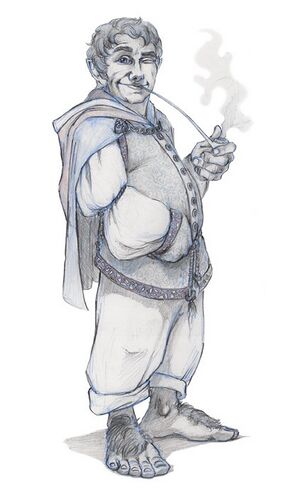Hobbit (race)

Hobbits are small humanoids, although typically less burly than the similarly-statured Dwarves. They are generally unagressive and avoid conflicts if at all possible, but are surprisingly capable of defending themselves should the need arise.
Appearance: A shorter folk (although not nearly as lilliputian as gnomes), hobbits are also easily recognized by their curly hair and preference for bare-footedness. As they are generally fond of eating well they're often a bit stocky, however downright fat hobbits are very rare. Hobbit clothing tends to be practical yet well-composed, with a penchant for waistcoats and other sleeveless outer-garments. Stripes are commonly favored for more formal occasions, owing to some long-forgotten tradition.
Culture: While cities might attract more ambitious and materialistic peoples, hobbits broadly prefer bucolic, agrarian lifestyles in small villages, or "shires." Because they are naturally unambitious, an outsider might think them lazy or complacent. In fact, hobbits are a diligent people whose work ethic can rival that of dwarves. It's just that they chose to pursue simpler things: most hobbits will choose a good sandwich over promise of power! Because they rarely interact and trade with the bigger folk, hobbits are a very self-sufficient and multi-talented bunch, and many are quite proud of their ability to produce a wide variety of goods.
Dwellings are usually built to blend in and harmonize with their environs (in wooded communities for example, houses are often "grown" by lashing saplings together into a living house!). Hobbits naturally prefer quieter lifestyles, but despite this, most love to entertain company, and many design their abodes with hosting guests in mind. Some hobbit families can be almost aggressively hospitable. As is said of one notorious hobbit clan: "no one leaves hungry, whether they like it or not!"
Customs will vary from shire to shire (which can be found in almost any biome), but nothing defines hobbit culture like food! Rich, hearty, and always soul-warming, many bigger folk who have dined with hobbits have been amazed to discover how nourishing hobbit cuisine can be, having eaten their fill long before their hobbit hosts have! Hobbits are also adept brewers and distillers. They might not posses the alcohol tolerance of dwarves, but they can brew up a wide variety of beer, wine, and other libations. Many hobbit-made beverages are impossible to find outside of their particular shire.
Although there's been some talk of it, hobbits never really got around to establishing their own organized religion. Most regard the natural world as a god-figure in and of itself, and see their naturally harmonious lifestlye as a "good enough" stand-in for any organized religion, judging the morality of something by its impact on its environment. Due to their slower lifestyle however, hobbits are well-adept to monastic and ascetic lifestyles. Those who do wander away from their shires often wind up as monks in some of the less uptight faiths.
Habitats: As a highly adaptable and self-sufficent race, hobbits can be found in almost any corner of the world, each with its own distinct traits. A few are listed below:
-Grassland: The most common of all hobbits. Grasslanders are excellent farmers, and know how to grow a wide variety of produce. They commonly dig their abodes into rich-soiled hillsides, planting their crops right over their roofs! Life in a grasslander shire revolves around the harvests, which are usually celebrated with extravagant feasts that can last for days.
-Sand: These desert herders are regarded as the best stonewrights and masons of all hobbits. Sand hobbits are also keen traders and merchants who love to haggle and bargain, often to somewhat absurd lengths. They are more athletic than most and love to host sporting events. Probably the most combat-capable hobbits, being skilled strategists as well as athletes.
-Mountain: A hardier folk, mountain hobbits reside in the foothills of great mountain ranges and excel in the forge and in the mine. Mountain hobbit-made tools are prized for their durability as well as their beauty. Their clothing is often dyed a distinctive red produced from ores. Sometimes mistaken as dwarves by the less discerning, as they typically sport more facial hair than the other hobbits.
-Forest: Taller and slighter, forest hobbits are naturally quick and agile. To better cammoflage their dwellings from the less civil sylvan citizens, they often build their villages high in the forest canopy. Music and dancing is nearly as important as food to forest hobbits, and many take up careers as traveling musicians. Fond of humor of all sorts, some forest hobbit families have sustained practical joke wars for many generations.
-Sea: The sea hobbits inhabit the world's waterways, coasts and islands. They build their homes with riparian plants, and floating houses aren't too unusual! Skilled fishermen, they also produce beautiful wickercraft and jewelry, using stones polished by the waves. Sea hobbits vaue boating highly, and many take extreme pride in their vessels and their ability to pilot them.
-Snow: These cold-dwelling, fur-clad hunters are the most scholarly and spiritual hobbits, observing and recording the stars from their icy sanctums during the long polar winters. They're typically larger than other hobbits, due to their need to generate and maintain body heat. To the outsider, they may seem quiet and aloof. More often than not they're just shy, but generally just as good-natured as any other hobbit.
Known Hobbits:
